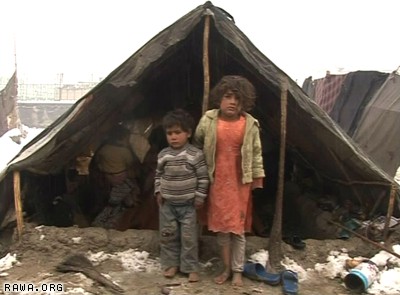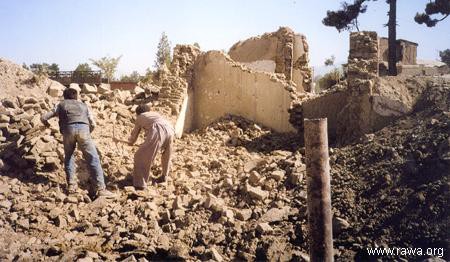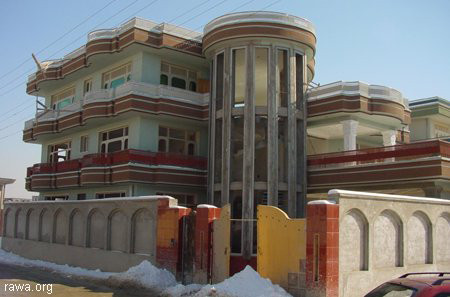KABUL (AP) -- The man on the motorcycle was going the wrong way down a one-way street, gesturing indignantly for the phalanx of traffic-clogged cars in front of him to move.

According to Bashardost, about 80 percent of the country is without electricity and unemployment is 60 percent.
''Brother, why are you angry with us?'' said a passenger leaning out of one of the vehicles blocking his path. ''It's you who are going the wrong way!''
''I'm not angry at you, I'm angry at Afghanistan,'' the man cried back, waving his arm dismissively as he negotiated his bike onto a crowded sidewalk and drove off in a trail of exhaust fumes. ''These are sad days.''
In Kabul, even a traffic jam can provoke a comment on this Islamic nation's dismal state, which most people here believe is at its bleakest since the U.S. invaded to topple the Taliban in 2001. It's a striking sentiment when you consider it comes after eight years of international intervention, $60 billion in foreign aid and the lives of thousands of foreign troops and Afghan civilians.
The Obama administration is hoping to reverse that trend as an additional 30,000 American and 7,000 NATO troops pour into the conflict in coming months. But ''the more soldiers they send here, the worse it gets,'' said 19-year-old carpet seller Hamid Hashimi.
In the year after the Taliban fell, international forces numbered a modest 12,000 or so. Today that figure has swollen to well over 100,000 and will approach 140,000 with the latest troop commitments. There are also 100,000 Defense Department contractors supporting the military effort, according to U.S. lawmakers.
The insurgency has mushroomed in equal measure.
The war -- once mostly limited to Pakistan border -- has spread to nearly ever corner of the country. It has also penetrated the frontier-like capital, where car bombings or other spectacular attacks like the October storming of a guest house filled with U.N. staff make news every couple of weeks.
It wasn't supposed to be this way.
When the Taliban were overthrown in the wake of the Sept. 11 attacks, aid groups, analysts and Afghans themselves all believed the nation was finally emerging from a quarter century of war.
In retrospect, there wasn't much of a break.
''In those days people had hope, but unfortunately everything has turned upside down since then,'' said Hanif Hangam, who stars in an Afghan comedy TV show called Alarm Bell. ''People expected things to go forward, but we've just been sliding back.''
The irony is that so much has changed in Kabul.
A vast sea of blown-out buildings in the west of the city has been completely rebuilt. Multistory shopping malls encased in glass symbolize a newfound prosperity, towering above streets lined with travel agencies, internet cafes, and even Afghan Fried Chicken, a local fast-food chain.
At night, rainbow-colored flashing palm trees climb the walls of splashy new wedding halls. Newly connected electricity lines light up mountainsides ringing the capital, whose population has tripled in the last eight years to 4.5 million as millions of refugees returned.


Many think some of those funds have been diverted to places like the city's Shirpoor neighborhood, where the powerful clique Washington brought to power eight years ago bulldozed dozens of crumbling mud-brick homes occupied by squatters and divvied the land among cronies.
Residents are also embracing freedoms anew: a majority of women have shed the once-ubiquitous blue burqas mandated by the Taliban in favor of flashy headscarves that shine in the night. And from one state TV channel in 2001, there are now more than 20 private stations with 3-D graphics and talk shows that rival any abroad.
''People can finally can talk openly about what's gone wrong,'' Hangam said of the media boom. ''They can criticize the government and warlords, point out corruption. But unfortunately, nobody is listening. We never see anything change.''
Indeed, the news today is the same as it was eight years previous, there is just more of it: Car bombs and rockets rock Kabul. Civilians die accidentally in U.S. air strikes. Afghan security forces are in dire need of training. The opium trade is booming.
And just like 2001, President Hamid Karzai is derided as the ''mayor of Kabul'' by critics who say his authority doesn't extend much further than the city limits.
''It's a disaster,'' said Ramazan Bashardost, a lawmaker who came in a distant third in the country's botched August election, which was marred by fraud so widespread a third of Karzai's ballots were thrown out. ''The situation is getting worse every day for ordinary Afghans.''
According to Bashardost, about 80 percent of the country is without electricity and unemployment is 60 percent. Many families can only afford to eat once a day and corruption is so rampant, ''it's practically legal,'' he said.
''People ask, 'What has democracy brought?''' he said. Besides helping keep warlords accused of war crimes in power, Bashardost added, ''the answer is: insecurity.''
Guerrilla attacks have made even provinces surrounding the capital unsafe. Hashimi said his family owns land in Wardak province, which neighbors the city, but he hasn't been home in years because the roads are too dangerous.
Alongside billboards advertising modern utilities like BlackBerry smartphones are others hawking armored transport. The local ''Scene'' magazine includes ads for shops selling bulletproof vests, and most of the people pictured inside its ''Party Scene'' section are foreign correspondents who came to cover the war.
Downtown, protective blast walls have grown larger outside U.S. and U.N. facilities, and some streets have been closed to public traffic. Helmeted soldiers peek out of sandbagged guard posts at government ministries. Residents like Hashimi cringe whenever they walk past -- fearful the offices will be targeted by bombers.
Outside Thai and Indian restaurants in one posh neighborhood, bodyguards in black suits stand in the middle of streets like gangsters, holding small, uzi-like automatic weapons as officials climb into black SUVs with tinted windows. And when security prevents dining out, the Wakhan cafe has signs that say: ''Locked Down! No problems'' -- they deliver.
The U.S. Congressional Research Service said in a recent report that foreign assistance pledged to Afghanistan since 2001 has topped $58 billion, about $38 billion of it from the U.S. alone.
But ''what happened to all this money?'' said Bashardost. ''Has garbage been cleaned up? Have all the streets been paved?''
Many think some of those funds have been diverted to places like the city's Shirpoor neighborhood, where the powerful clique Washington brought to power eight years ago bulldozed dozens of crumbling mud-brick homes occupied by squatters and divvied the land among cronies.
Residents deride the gaudy mirrored mansions as ''poppy palaces'' because they are believed to have also been constructed in part with money from the drug trade. Few believe their owners could have built them with paltry official salaries; they cost hundreds of thousands of dollars and rent for $20,000 per month.
''We've built a lot of buildings,'' lawmaker Shukria Barakzai said with a sigh at a recent government ceremony commemorating the deaths of thousands of Afghan police and soldiers. ''But we've lost a lot of hope.''



